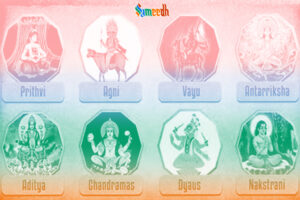The 8 Vasus are one of these categories within the broader concept of the 33 Koti Devatas. They are eight elemental gods (called “Aṣṭa-vasu”, ‘Eight Vasus’) representing aspects of nature (The Five Elements – Pancha Bhoothas) and also representing cosmic natural phenomenon (The Sun, The Moon and The Stars). The name Vasu means ‘Brilliance’ or ‘Wealth Givers’. They are eight among the Thirty-three gods.

The 8 Vasus are one of these categories within the broader concept of the 33 Koti Devatas. The 8 Vasus are considered a group of eight divine beings associated with different aspects of nature and cosmic phenomena. They are considered a subset of the broader category of gods and deities in Hindu mythology. The Vasus are mentioned in ancient Hindu texts like the Rigved and the Mahabharat. Here’s a brief explanation of the 8 Vasus:
- Dharaṇa (or Prithvi): Dharaṇa represents the Earth or land. She is often depicted as the goddess who embodies the earthly realm and sustains life. The name Dharaṇa itself is derived from the Sanskrit word “dhara,” which means “the one who holds” or “the supporter.”
- Anala (or Agni): Anala is associated with fire, particularly the destructive aspect of fire. He represents the transformative power of fire and its ability to purify. In Hindu rituals, Agni is invoked as a messenger between humans and the gods. The sacred fire, often present in Vedic rituals, is considered a medium through which offerings are conveyed to the deities.
- Anila (or Vayu): Anila is the deity of wind or air. He symbolizes the life-giving and dynamic force of the wind, which is essential for all living beings. In some traditions, Vayu is also considered the father of Lord Hanuman, a central figure in the Indian epic, the Ramayan.
- Apa (or Jala): Apa represents water. She embodies the nurturing and purifying aspects of water, which sustains life and promotes growth. In Hindu cosmology, water is considered a purifying and life-giving force, and Apa is invoked in rituals where the element of water is central. Apa, is considered benevolent deities, and they are associated with various aspects of the natural world.
- Dhruva (or Nakshatra): Dhruva is often associated with the pole star, which is unchanging and stable in the sky. He represents the eternal and unchanging nature of the cosmos. The pole star, or Dhruva Nakshatra, is significant in Hindu cosmology as it is seen as a fixed point in the night sky. In many Hindu traditions, Dhruva is considered as a symbol of steadiness, constancy, and divine order. The term “Nakshatra” is more broadly used in Hindu astrology to refer to the lunar mansions or divisions of the ecliptic.
- Soma (or Chandra): Soma is the deity of the Moon and represents the cool, soothing, and nourishing aspects of nature. He is also associated with a sacred drink used in Vedic rituals. The Soma drink is considered divine and is often mentioned in Vedic hymns. Soma is sometimes personified as a deity, and in some traditions, it is linked to the plant called “Soma,” from which the sacred drink was supposedly prepared.
- Aditya (or Sun): Pratyush or Aditya represents the brilliance of daylight. He signifies the illuminating power of the sun. As the Sun god, Aditya is revered as a source of light, energy, and life. The sun is a central figure in Hindu mythology, symbolizing consciousness, knowledge, and the source of all energy on Earth.
- Dyaus/Prabhas (or Sky/Ether): The term “Prabhas” is associated with brilliance or radiance, and it underscores the luminous and vast nature of the sky. Dyaus, as the sky father, is sometimes envisioned as a divine being that provides light, space, and the framework for the universe. Prabhas symbolizes the connection between the sky or heaven and various natural elements or cosmic forces.
Theses term may be invoked in certain rituals or mythological contexts to represent the harmonious relationship between these divine entities within the Hindu cosmology.